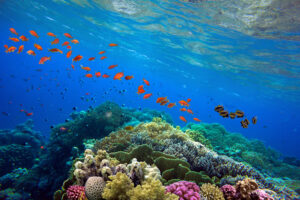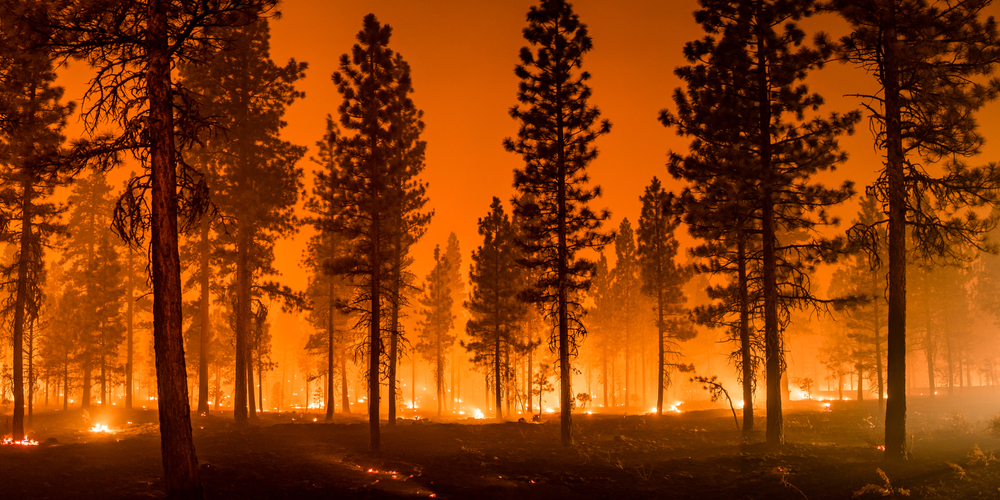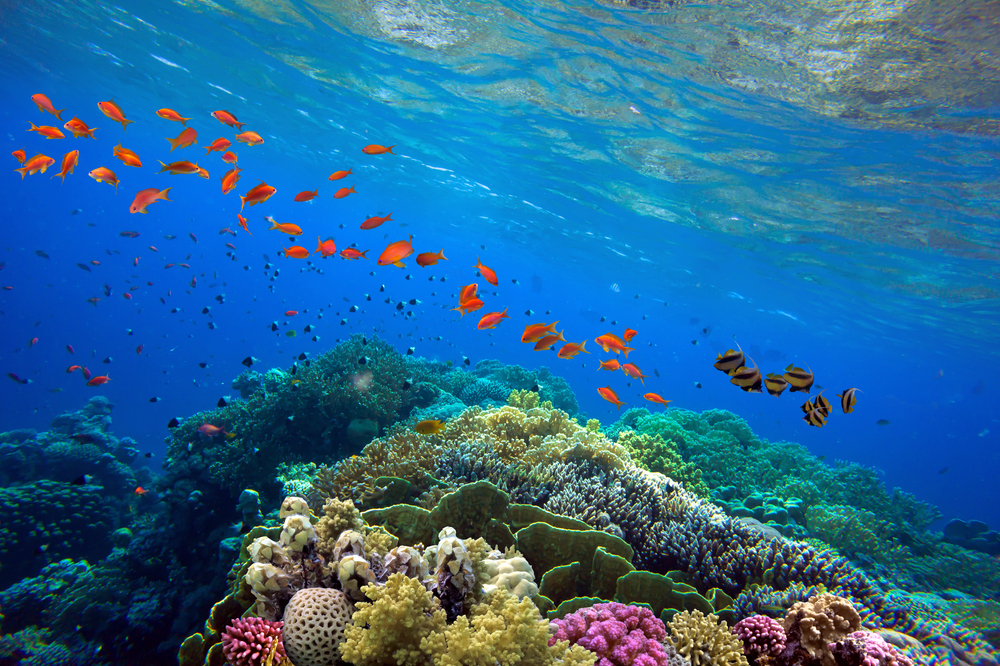Introduction: A Global Menace and a New Perspective
In recent years, the global community has been confronted with an alarming surge in devastating wildfires, a stark and often tragic consequence of climate warming. Beyond the immediate destruction of forests and habitats, the ramifications of these wildfires extend far and wide, seeping into the delicate balance of ecosystems. While extensive studies have historically focused on the impact of wildfires on terrestrial landscapes, groundbreaking research from the University of California San Diego and other esteemed institutions has brought to light a previously overlooked dimension—wildfires’ profound influence on aquatic ecosystems. This revelatory insight, highlighted in two comprehensive research studies published in the esteemed journal Global Change Biology, signifies a paradigm shift in our understanding of the far-reaching consequences of climate-induced wildfires.
The research, spearheaded by a collaborative effort from experts in ecology, environmental science, and climate studies, represents a pioneering exploration into the intricate interplay between wildfires and aquatic environments. Historically, the attention has been predominantly directed towards the immediate effects of wildfires on land, such as loss of biodiversity, soil erosion, and altered vegetation dynamics. However, the newfound recognition of wildfires as transformative agents in aquatic ecosystems underscores the interconnectedness of environmental processes in the face of climate change.
The studies unveil a cascade of effects triggered by wildfires that reverberate through aquatic ecosystems, encompassing rivers, lakes, and other water bodies. One of the key findings illuminates the alteration of water quality, as the combustion of organic matter during wildfires releases a myriad of compounds into the atmosphere. These compounds, ranging from ash particles to dissolved organic carbon, find their way into water sources, potentially impacting water chemistry and nutrient cycles. This, in turn, can have profound implications for aquatic flora and fauna, disrupting the delicate equilibrium that sustains these ecosystems.
Moreover, the research sheds light on the influence of wildfires on hydrological patterns. The intensified heat from wildfires can lead to alterations in precipitation patterns, affecting the volume and timing of water runoff into aquatic systems. Changes in hydrology can further exacerbate the stress on aquatic organisms and ecosystems, potentially leading to shifts in community structure and biodiversity.
The revelation of wildfires’ impact on aquatic ecosystems introduces a critical dimension to the ongoing discourse on climate change and its ecological consequences. It underscores the need for a holistic approach in assessing and mitigating the effects of wildfires, recognizing that the ecological footprint extends beyond the visibly scorched landscapes to include the intricate web of interconnected ecosystems.
As the world grapples with the increasing frequency and intensity of wildfires, the research from the University of California San Diego and its collaborators serves as a clarion call for a comprehensive and integrated approach to environmental conservation. It emphasizes the urgency of understanding the multi-faceted consequences of climate-induced phenomena and underscores the importance of informed conservation strategies that account for the intricate relationships between terrestrial and aquatic ecosystems.
In conclusion, the paradigm-shifting research on wildfires’ influence on aquatic ecosystems represents a significant leap forward in our comprehension of the broader ecological impacts of climate change. The revelations underscore the imperative for proactive conservation measures and a collective global effort to address the multifaceted challenges posed by wildfires and their far-reaching consequences on the delicate balance of our planet’s ecosystems.
Investigating Aquatic Ecosystems in the Aftermath
Led by Professor Jonathan Shurin’s laboratory in the School of Biological Sciences, the research pioneers an exploration into how aquatic ecosystems undergo rapid transformations in response to wildfires. The investigations delve into the intricate web of burnt plant matter’s impact, unraveling the effects on aquatic food webs and the broader carbon cycle within these ecosystems.
Fundamental Changes in Carbon Dynamics
One of the key revelations emerging from the research is the chemical transformation of plant debris by fire, ushering in a fundamental change in the role of aquatic ecosystems in the carbon cycle. The shifts identified signify a departure from conventional norms, pointing to altered processes in the storage, processing, and emission of carbon within these aquatic systems.
Aquatic Ecosystems as Carbon Sinks

Aquatic ecosystems, often regarded as essential carbon sinks, play a pivotal role in capturing water flows and storing carbon in their sediments. The research underscores the importance of recognizing the impact of wildfires on these systems, emphasizing their significance as integral components in the broader context of water resources, aquifers, and recreational fishing.
Beyond Terrestrial Boundaries
Highlighting the interconnectedness of ecosystems, Postdoctoral Scholar Chris Wall, a key contributor to the research, emphasizes that the effects of wildfires extend beyond terrestrial systems. Burned materials flow directly into waterways crucial for both human populations and wildlife. This revelation prompts a reevaluation of the far-reaching influence of wildfires, urging a comprehensive understanding of their implications on ecosystem health.
Ponds as Crucial Players in Carbon Storage
The research unveils intriguing findings about the role of ponds in the carbon cycle. Normally emitting more carbon dioxide than they absorb, ponds receiving burnt materials exhibited a shift toward greater carbon storage. This newfound capacity for increased carbon storage, fueled by the biological carbon pump of lakes, provides insights into the intricate dance between wildfires and carbon dynamics within aquatic ecosystems.
Complex Responses to Burned Material Inputs
As the research unfolds, it becomes apparent that the relationship between aquatic ecosystems and burnt plant materials is nuanced. While burned plant matter fuels the biological carbon pump, allowing lakes to absorb more carbon dioxide from the atmosphere, this capacity diminishes with higher quantities of burned material. The study establishes a threshold beyond which the benefits of increased carbon storage are offset by higher carbon dioxide export to the atmosphere.
Implications for Global Carbon Cycling
The researchers extrapolate the implications of their findings to a global scale, emphasizing that more frequent and intense wildfires could alter the capacity of aquatic systems to store, transform, and exchange carbon with the atmosphere. This insight underscores the need for integrative models in climate change forecasts, accounting for the feedbacks between aquatic and terrestrial ecosystems to comprehensively grasp changes in the global carbon cycle.
Experimental Insights into Ecosystem Dynamics
The research methodology involved a series of experiments conducted at UC San Diego, employing experimental pond systems across a 90-day testing period. By manipulating varying amounts of burned and unburned plant matter, the researchers meticulously traced the impact on ecosystem dynamics. Fertilizing sage plants with nitrogen facilitated the tracking of chemical movement from plant leaves into the food web, providing a comprehensive understanding of the transfer of nutrients through aquatic species.
Ecological Transformations in Response to Burning
Intriguingly, the influence of burnt matter extended beyond carbon dynamics to reshape the inhabitants of experimental ponds. Unburned ponds retained species characteristic of typical aquatic systems, while those inundated with burned material transformed into habitats favoring insects such as mosquitoes. This shift in ecological composition underscores the cascading effects of burning on detritus composition, with profound implications for ecosystem function.

A Call for Holistic Climate Change Forecasts
In their conclusive remarks, the researchers advocate for a holistic approach to climate change forecasts. They assert that future predictions should incorporate integrative models, accounting for the intricate feedback loops between aquatic and terrestrial ecosystems. Only through such comprehensive models can the global community truly understand the impending changes to the intricate dance of the global carbon cycle.
Conclusion: Navigating the Waters of Change
As the pages of this groundbreaking research unfold, a new chapter is written in our understanding of wildfires’ impact. Beyond the charred landscapes, the ripples of devastation extend into aquatic realms, reshaping the dynamics of carbon storage, nutrient transfer, and ecosystem composition. The call to action is clear: we must navigate the waters of change with vigilance, incorporating these newfound insights into our strategies for conservation, climate adaptation, and global sustainability. The intricacies of the natural world demand a holistic approach, and as stewards of the planet, it is our responsibility to comprehend, adapt, and preserve the delicate balance that sustains life on Earth.
Epilogue: A Pledge for Future Generations
In the wake of these revelations, a pledge emerges—an unwavering commitment to safeguarding our ecosystems for future generations. The journey toward understanding the full spectrum of wildfire impacts continues, guided by the beacon of knowledge illuminated by this research. Together, as custodians of the Earth, we embark on a collective endeavor to navigate the evolving dynamics of our planet, ensuring a legacy of resilience, harmony, and sustainability for the generations yet to come.
